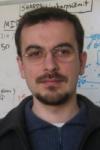非常抱歉,
你要访问的页面不存在,
非常抱歉,
你要访问的页面不存在,
非常抱歉,
你要访问的页面不存在,
验证码:

职称:Asst Prof Mol Cell & Dev Biology
所属学校:Yale University
所属院系:Molecular, Cellular and Developmental Biology
所属专业:Cell/Cellular and Molecular Biology
联系方式:203-737-3255
Using the yeast Saccharomyces cerevisiae as a model organism, we study the genetic and phenotypic changes cells implement and experience during the processes of Adaptive Gene Network Evolution and Cellular Aging. We are interested in understanding how gene networks are rewired while cells evolve in controlled laboratory environments. Our work combines experimental, theoretical, and computational approaches to investigate general design principles that help gene networks robustly function in a variety of genetic backgrounds and environmental conditions. We are also interested in uncovering the genetic mechanisms of cellular aging. Which genes and gene networks are responsible from controlling the aging process? Which decision-making sequences can be executed to maximize the life span of a living system? Despite the fundamental nature of these questions, we have very limited understanding on the cellular mechanisms governing aging. Our laboratory applies quantitative Systems Biology approaches, single-cell time-dynamic imaging techniques, and novel microfluidic platforms to the study of this complex phenotype, with the goal of gaining novel insights into the regulation of cellular aging. Projects in our lab make extensive use of single-cell level experimental methods such as fluorescence microscopy and flow cytometry. For a mechanistic understanding of experimental results, we also build simple quantitative models of cellular activities.
Using the yeast Saccharomyces cerevisiae as a model organism, we study the genetic and phenotypic changes cells implement and experience during the processes of Adaptive Gene Network Evolution and Cellular Aging. We are interested in understanding how gene networks are rewired while cells evolve in controlled laboratory environments. Our work combines experimental, theoretical, and computational approaches to investigate general design principles that help gene networks robustly function in a variety of genetic backgrounds and environmental conditions. We are also interested in uncovering the genetic mechanisms of cellular aging. Which genes and gene networks are responsible from controlling the aging process? Which decision-making sequences can be executed to maximize the life span of a living system? Despite the fundamental nature of these questions, we have very limited understanding on the cellular mechanisms governing aging. Our laboratory applies quantitative Systems Biology approaches, single-cell time-dynamic imaging techniques, and novel microfluidic platforms to the study of this complex phenotype, with the goal of gaining novel insights into the regulation of cellular aging. Projects in our lab make extensive use of single-cell level experimental methods such as fluorescence microscopy and flow cytometry. For a mechanistic understanding of experimental results, we also build simple quantitative models of cellular activities.